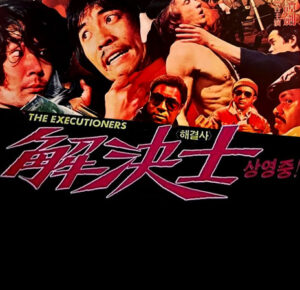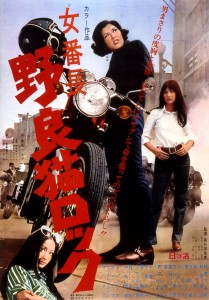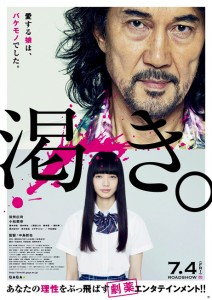AKA: Alleycat Rock: Female Boss
Director: Yasuharu Hasebe
Writer: Hideichi Nagahara
Cast: Akiko Wada, Meiko Kaji, Koji Wada, Bunjaku Han, Yuka Kemari, Hanako Tokachi, Yūko Shimazu, Yuka Ohashi, Miki Yanagi, Toshimitsu Shima
Running Time: 80 min.
By Kelly Warner
After Roger Corman’s 1966 outlaw biker film The Wild Angels (which starred Peter Fonda pre-Easy Rider) became a surprise hit in Japan, Japanese studios were quick to cash in and make similar films. One such popular film was Toei’s Delinquent Boss from 1968. The Nikkatsu film studio saw Stray Cat Rock: Delinquent Girl Boss as their way to jump in and compete with Toei’s product. Unlike most films with copy-cat origins, Delinquent Girl Boss successfully started a series that ran for five films (spread out over just two years) and is fondly remembered as one of the country’s best film series of the 1970s.
In Delinquent Girl Boss, Nikkatsu basically took a bit of everything that was working for them at the time and threw it all together. We get a yakuza action movie plot infused with rock & roll, 70s counterculture, violent youth, girl power, and a dash of ‘pinky violence’ to top it all off. It’s not an original movie – at least not on the surface – but it’s an entertaining mix.
The plot is simple and familiar but it plays out in an interesting way. Meiko Kaji (Lady Snowblood) plays Mei, the boss of a girl gang. Mei’s girls are at war with a motorcycle gang, who it turns out is backed by a powerful yakuza family. Mei’s in love with Michio (Koji Wada), who is trying to prove his worth to the yakuza by asking his boxer friend Kelly to take a fall and make the gangsters rich. Kelly (Ken Sanders, Massacre Gun) is understandably conflicted. He wants to do right by his friend, but he doesn’t want to sell himself out and throw a fight. All of this is fairly standard crime movie stuff. But what’s interesting is that everything is riding on the decision of Kelly, a supporting character. Whatever Kelly does will decide the fate of everyone else in the film. I liked that. Most of the time the storyline of the boxer and the mob is seen from the boxer’s perspective, here the scope is wider.
I also enjoyed the depiction of the girl gangs. The women here are fully capable of taking care of themselves. Early in the film we see two female gangs square off. They don’t look like much at first, but then the knives come out and it’s just as tough and bloody as similar sequences in male-led films. One action sequence later in the film depicts the women coming to the rescue of a kidnapped male friend. It occurred to me how incredibly common it is to see a man rescue a woman but how rare it is to see those gender roles reversed in such a situation. In a lot of ways, Asian cinema was ahead of Hollywood when it came to female action stars. As far as Japan went, I think part of this is can be traced to the fact that women went to the movies much more than the men did. In the 1970s Meiko Kaji became the biggest female star in Japan and it was because of her action roles, not comedies and dramas as would be the norm for an actress in Hollywood.
Despite being considered a series, the Stray Cat Rock films are only loosely connected to one another through themes and actors. Repeat stars Meiko Kaji, Tatsuya Fuji, and Bunjaku Han play characters with different names and motivations in each film. It’s Kaiji that holds the films together and has made the series a cult classic that lasts. So it’s interesting that in Stray Cat Rock: Delinquent Girl Boss, Kaji plays second fiddle to singer and first-time actress Akiko Wada.
It’s clear from the very beginning that this was meant to be Wada’s movie. Japanese studios (Nikkatsu in particular, I think) were known for producing star vehicles that not only showed young talent being cool on screen but also showcased their singing abilities (see: Tokyo Drifter). The reason was not only to help launch a rising star, but also so they could keep selling records of the songs from the movie. Akiko Wada is a good singer and the film lets her sing a song whenever the action has slowed down for a minute. I’m less certain about her abilities as an actress, however (she only acted sporadically after Delinquent Girl Boss). While clearly meant to be a star vehicle for Wada, it was Kaji that the audiences connected with. The film helped make Kaji a star and it seems like it all happened by accident.
Working with a small budget, Nikkatsu allowed director Yasuharu Hasebe some creative freedom with the film. Hasebe shows more experimentation here than he did in earlier films like Retaliation and Massacre Gun. He slants the camera at odd angles, giving us a skewed view of the performers. He uses interesting editing techniques, sometimes showing a close-up on one actor and a wide shot of a second actor in the same frame. He even plays with colorful graphics from time to time. At times I was reminded of the more playful and experimental films of Nagisa Oshima. Thankfully style does not overwhelm substance, it merely adds to it, making it a fun movie for film buffs as well as an entertaining action movie for general audiences.
Stray Cat Rock: Delinquent Girl Boss was released in May 1970 and was a huge success. Production immediately went underway on a follow-up. The sequel Stray Cat Rock: Wild Jumbo premiered in August that same year, just three months after the original. It boggles the mind. This may not be a film for newbies to the genre, but for fans of Nikkatsu’s action movies and star Meiko Kaji I think it hits the mark. I’m looking forward to checking out the rest of the series.
Kelly Warner’s Rating: 7/10























2 Comments